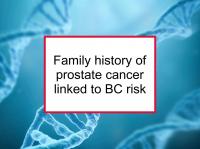Women with a family history of breast cancer have a higher risk of breast cancer than the general population. The heightened risk varies according the relatedness of affected family members. This is true whether or not they have BRCA mutations. In fact, the majority of women with a family history of breast cancer are not BRCA mutation carriers.
The degree of extra risk varies according to whether the family members with breast cancer are first degree relatives (parent, sibling or child) or second degree relatives (grandparent, aunt/uncle, half-sibling), and whether the disease has been diagnosed in multiple family members.
Breast cancer risk is inherited from the father's as well as the mother's side of the family. In fact, daughters of fathers with breast cancer or BRCA mutations tend to develop breast cancer at a younger age than daughters of mothers with breast cancer or BRCA mutations. Now a new study has reported that prostate cancer in first degree family members heightens a woman's risk of developing breast cancer, especially for African Americans.
Breast cancer inherited from fathers is different
Despite many similarities, breast cancer in men and women has genetic differences, as shown, for example, by the fact that the androgen receptor (AR) appears to have a far more prominent role in male breast cancer than in female breast cancer. Therefore, it is to be expected that breast cancer susceptibility inherited from a father might express itself differently than breast cancer susceptibility inherited from a mother. In fact, maternal and paternal inherited BRCA alleles may not be exchangeable. Differences in risk of disease and other disease characteristics that depend on which parent donated the disease allele are known as parent-of-origin effects. Detailed data concerning such effects is limited. One thing that is known is that inheriting breast cancer risk from both father and mother results in a devastingly high risk of breast cancer - when both parents are diagnosed with breast cancer, the risk for their daughter is increased tenfold.
Some other cancers in men are linked to breast cancer in daughters
An inherited cancer predisposition typically does not cause cancer at one site only. Certain tissues appear to share susceptibility to carcinogenesis. Daughters of fathers with prostate cancer are known to have a higher risk of breast cancer than the general population. In addition, liver cancer in fathers has been found to be associated with breast and ovarian cancer in daughters. More generally, non-BRCA carrier families with multiple instances of early-onset breast cancer have also been found to have higher rates of brain, lung, and urinary tract cancers.
Lobular breast cancer is a special case. Women with lobular breast cancer are more likely to have a father with cancer than a mother with cancer. In line with other breast cancer types, prostate cancer in a father increases the risk of lobular breast cancer in his daughters. However, the heightened risk associated with a father's cancer remains even after excluding prostate cancer, indicating that it is not related only to prostate cancer. For example, compared to other breast cancer types, sarcoma and leukemia occur more often in fathers of lobular breast cancer patients.
Latest research finds familial prostate cancer increases BC risk
The study referenced at the beginning of this news article was designed to investigate the relationship between breast cancer and prostate cancer in families, particularly among African Americans. The study included 78,171 initially cancer-free participants in the Women's Health Initiative observational cohort. A total of 3,506 of the women were diagnosed with breast cancer through August, 2009. The analysis was adjusted for known breast cancer risk factors.
A family history of prostate cancer was found to be associated with a modest 14% increase in breast cancer risk. However, a family history of both breast and prostate cancer was associated with a 78% increase in risk. The risk was even higher among African-American women with familial breast and prostate cancer: 2.34 times the risk of similar white women. The authors conclude that prostate cancer diagnosed among first degree family members heightens a woman's risk of developing breast cancer. The relative contributions of genes and a shared environment need to be determined in future studies.
Please see our article on familial breast cancer for more information.
